- Home
- Taylor Caldwell
The Strong City
The Strong City Read online
The Strong City
A Novel
Taylor Caldwell
TO
MY BROTHER
with affection
FOREWORD
I wish at this time to acknowledge the kind and courteous assistance given me by the officials of the Bethlehem Steel Company of Lackawanna, N. Y., in acquiring the industrial background of this book. At all times they extended patient help to me, and gave me many suggestions. If I have made mistakes, they are my own.
While I was being conducted through the Lackawanna Plant, it was brought forcibly to my attention that great changes have taken place in America in labor-relations during the past few decades, and that there has been an awakening of a social conscience among the more powerful industrialists. I am sure that the Bethlehem Steel Company has played its tremendous part in this awakening.
TAYLOR CALDWELL
BOOK ONE
CHAPTER 1
The gray November day was gritty with fog and coal dust. A visible ash floated through the dry dead air darkening what little light the morning gave like a palpable mist. The ash crunched under foot; it swirled against the walls of buildings and besmirched them still more, if possible. Every window was coated with it. Every door was streaked with it. Now that it was half-past six, and the dawn barely begun, a forest of chimneys, a veritable jungle of chimneys, vomited forth dark-brown, dark-gray and black volcanoes, which were absorbed into the permanent ash-mist of the city, increasing it, enhancing its body. The city heaved a subterranean groan, almost inaudible. It was morning. Behind a thousand, thousand walls the people were stirring, glancing heavily through the smeared windows, feeling a greater heaviness in their hearts as they faced the long, somber and oppressive day.
Those who were rich merely opened a jaundiced eye, shivered at the contemplation of the morning, and turned over in soft silken beds. Sleep was an escape. Those who were intelligent reflected that life had again demonstrated that the Chinese were quite correct in saying that most men’s lives were lived in a state of quiet desperation. Those who were not rich, but merely middle-class, grumbled discontentedly, and pondered on whether the bacon would be burned this morning and execrated an overburdened maid-of-all-work for her languor or stupidity. And those who were poor and hopeless, and generally reputed not to be able to think at all, looked at the morning with the blind dull eyes of cattle, and felt, rather than reflected, that they were lumbering about in some vague, nightmarish pit of subexistence where even pain, however enormous, was a dim, all-pervading fog.
The mighty steel mills lined the border of the river, lead-colored, streaked with repulsive purple, green or blue in the sickly, underworld light. It was only half-past six, but the mills were muttering on a rising crescendo. The workmen were coming in, heavy-footed as yoked animals, their heads bent forward, their bodies shivering in thin patched clothing. They had only one desire: to be warm.
Mulberry Street was only one street in the city, but it was typical. It was a short street, begining in a confusion of cross streets, and ending abruptly against the blank brick wall of a paper-factory. Along the west side of the street there rose a three-story, thirty-family brick tenement, once terra-cotta colored, but now gray with coal-dust. The monotonous bay-windows were pewter-colored rectangles, behind which could be discerned the ghostly glimmer of dirty curtains. Three brown stone steps led down from every doorway to the street. Here the perpetual ash formed a thick layer on each step. Each bay-window indicated a five-room flat. Somewhere behind the shallow lugubrious windows a yellow gas-light burned, the light in a kitchen where the men were preparing to leave for work. The acrid odor of fresh smoke smoldered through Mulberry Street. It was beginning to drizzle. The tenement house front became blistered with quick-silver drops of moisture, which ran down the windows and doors, and writhed in thin snake-like trickles over the brown stone steps.
Mulberry Street was paved with cobblestones, each one glistening with a livid light in the morning. Down this street, at intervals, clattered the brewers’ wagons, laden, the horses, wet of rump and flank, bending heavily against the load. Now the sky lightened rather than brightened, and swollen with quicksilver-colored clouds, seemed hardly to clear the rooftops.
A long, dull and doleful lament suddenly travelled the short length of Mulberry Street, accompanied by an equally sudden darkening of the sky, and a muted thunder. The lament pervaded the dank atmosphere, shaking it. The tenement and the cottages trembled, and the earth quivered underfoot. Behind the tenement was the long oozing slope of a muddy hill, littered with the household excreta of the dwellers, and at the foot of the hill a long train was passing, emitting its lament. Sparks and smoke blew from the engine, which was followed by an endless stream of cars, in furious flight. Once the train had passed, the quiet but faintly quaking rails gleamed in the morning’s half-light. But the smoke continued to rise in dark choking billows, and obscured the dirty back windows of the tenement with another layer of soot. Mulberry Street crouched once more under the drizzle and the clouds.
One of the grimy doors opened, and a young man emerged into the rain. He stood on the hollowed brown stone steps and glanced critically at the sky. Shabby and frayed though he was, like the other dwellers, the folds of his face and hands grimy in spite of hard washings, he seemed like a stranger to the street and the city. Perhaps it was his bearing, which was almost jaunty and contemptuous. Perhaps it was because he was not bent, and did not shuffle or hang his head. He merely stood on the steps, surveyed the sky and the street with a curious detachment. And as he did this, he chewed contentedly on an apple. His worn workman’s cap, brown and shapeless, was pushed far back on his head, showing his rough thick yellow hair, upon which the rain was dripping. In one hand he held his workman’s dinner pail, covered with a white cloth whose edges were visible under the lid.
He chewed noisily. He detached one finger from the apple and reflectively scratched his ear. He beat one foot against the wet step as though in time to some internally hummed chorus. The foot splashed in the shallow pool of water which had gathered in the hollow step. His eye, surveying the street, was not bitter. It was just contemptuous. Swallowing the last bite of his apple, he hummed aloud in a deep and sonorous baritone. Now the humming emerged into fragmentary words, Franz Schubert’s “Aufenthalt.” His eye, sardonic and glinting, and intensely blue, continued to wander with heightened realization over the street as he sang. The strong and melancholy strain of the song, the passionate words, seemed to spring from some wry amusement in the young man. He kept his voice low, but the melancholy grandeur of the song took on a savagery and a faint fury from the very quality of his voice, and had there been a single listener to hear, though he might not have understood the German words, he would have understood instantly the import of the singer and the phrases he sang, and the meaning of his glance at the sky and the street. The nostalgic sadness of Schubert’s love for his home became, in the voice of Franz Stoessel, ironic ridicule and a masochist’s brutal self-disdain.
He stopped singing, but the unpleasant glimmer of a smile replaced the song. He leapt down the two remaining steps and began to walk quickly, but without haste, swinging his pail. He threw the core of his apple into a puddle, watched the breaking swirls for a moment, and walked a little quicker. His step was not a shuffle; he kept his head high with arrogance. But there was waiting patience in his arrogance, and no discontent, and still no bitterness. However, his three years in the mills had not been without effect upon him. His jocular walk was more than a little self-conscious and deliberately determined. The muscles of his shoulders and arms bulged from labor, but they did not weigh him down. He swung his arms lightly. He stepped high and firmly. As he walked down other streets, each more dreary and desolate than
the last, his look became more and more rigidly detached and repudiating.
He stopped at a miserable little shop, skulking between a tailor’s wan establishment and a grocery store. He bought a package of tobacco and filled his pipe. The tiny shrivelled old man behind the counter took his time about changing the silver piece Franz had given him. Franz had brought a breath of courage and non-surrender into the dark and fetid interior of the shop. The old man liked him, but his grin and his gestures were condescending, as they were always condescending to the “foreigners” who worked in the mills.
“Very bad morning, Franz,” he said. He had been a bookkeeper, until his sight had failed. He was always careful to pronounce the endings of his words. It was his piteous belief that “real Americans” and superior people always pronounced the endings, thus distinguishing themselves from their inferiors.
Franz nodded. He sucked experimentally on his pipe. A cloud of good smoke emerged from his big mouth. He shot a critical but furtive glance at the old man.
“My mother gave me two slices of cheese cake for my lunch,” he said. “She was pleased to hear you liked it. So, there is one for you.”
He busied himself with his pail, which he had set on the splintered counter.
“That’s very nice of her,” said the old man, with condescending pleasantness. But a little wetness appeared at the corner of his sunken mouth. The shop was dark, lighted only by a swaying oil lamp hanging from the distempered peeling ceiling. The old man’s hands grasped the edge of the counter as though he rigidly controlled them, but the big knuckles trembled a little. “Very nice,” he repeated, in a dwindled voice, staring avidly at the pail. The tip of his tongue licked at the corners of his mouth.
Franz removed the snowy cloth and disclosed within a small covered dish of pigs’ knuckles and sauerkraut, a half sausage, some rye bread, an apple and the two slices of creamy-gold cheese cake, tenderly cradled in a flakey pastry. Franz hesitated. He looked shrewdly at the old man, who had forgotten him, and whose whole poignant attention was fixed on the lunch. He was like some old emaciated bird hovering passionately over food after a starving winter. There was something horrible in his fixed ecstasy and tenseness. No one, thought Franz, should have come to the pass when the contemplation of even the simplest food could arouse him to such indecent rapture. It was especially indecent in the old, and shameful.
He frowned, and said, in his thickly accented and guttural voice: “My mother. How she is lavish with the food! No man could eat all this. Be my friend, and take a part of it. This sausage. Half of this bread. This apple. I do not like apples. And this cake. If you do not take it, I shall have to throw it away, and it is a sin. No?”
With a painful effort, the old man removed his famished gaze from the pail. Again, he smiled condescendingly, and with indulgence. “My dear boy, how could I take your food? You work hard in the mills, I know. But then, if you really insist—”
Franz smiled grimly to himself. He placed the cloth fastidiously on the counter. These Americans! And soap was so cheap and plentiful. He put half his lunch on the cloth. He put the top back on his pail. The old man cocked his head whimsically and tried to survey the food with indulgent indifference. “I’ve had a big breakfast, too,” he remarked, with affectionate self-reproach.
Franz made no comment. He nodded curtly, sucked on his pipe, and left the store. But he glanced back through the mired window. The old man had ravenously attacked the food. He was thrusting huge portions of the bread in his mouth. He crouched over his counter gluttonously. Franz’s big heavy mouth twisted contemptuously. What an excellent philanthropist am I! he thought to himself, ironically. I am not really so good. But it does something really exceptional to me to give away food in this prosperous America! And to these superior Americans.
He reflected that his meal would be small. Nevertheless, the sardonic amusement in him was more valuable than food. It strengthened his fierce resistance to circumstance. Too much credit, he thought, has been bestowed on the giver. It would be harder to let the old Schweinskopf starve, and not nearly so pleasant. He hummed loudly to himself as he went down the street.
The streets were now filled with hurrying, shambling workmen going to the mills for the seven o’clock shift. They walked without conversation, without smiles, without glances beyond their feet. The desperate, piteous, contemptible laborers of the mills! Shabby, shivering, wet and hopeless, with dull fixed eyes, they aroused in Franz, not pity, but hatred. He deserted them for a roundabout way, which took longer.
He passed down a shut and squalid street composed of thin red-brick houses with shuttered windows. The street slept in its squalor of rain and soot, silence and furtiveness. Franz looked about him with interest. He jingled the change in his pockets. In five months, he reflected, he had not been able to afford a woman on this street. But in four more weeks it could be managed. That had been a pretty girl, that Hungarian, with the starved white face and gaunt eyes. She had coughed excessively. No doubt she was tubercular. In Germany, she would have been sent to a great clean white hospital, where, without cost, she would have been treated. He could not forget the girl. Probably she was now dead, poor creature. It was good. Human derelicts have no right to live. Those without resistance have no right in a world that demands resistance at every hour. His mother called it courage. But he knew better: it was resistance, and had nothing to do with any quality of the soul. Rather, it was compounded of contempt and anger, and a great disgust for the rest of humanity.
It was nearly seven. He began to walk faster. He had a long rapid stride, for his legs were strong and clean. He had come to a good middle-class neighborhood, two miles from his own home. The small houses were fresh and prim, the shutters white and green against the red brick. His walk quickened. More streets, each more prosperous than the last. And finally, a broad quiet avenue whose lawns, even in November, were wet and dimly green. Bare brown trees formed the skeleton of a nave that was all green shadow and religious silence in the summer. Beyond the lawns were houses of gray stone and red stone, pillared, pilastered, corniced and fretted. Behind really enormous polished windows he could see the silken shadow of curtains, the curve of rich velvets. Here and there was the golden glow of a lamp. Housemen, in the rain, were cleaning broad stone steps. Some were scouring horse-blocks. Franz stopped, as he stopped almost every morning, before a particularly huge red-stone mansion. The stone was the color of old dim morocco leather, and here the windows were twelve and fourteen feet high, and at least six feet wide. The house was full of porticoes, surrounded by pillars of smooth red stone. He saw gigantic carved doors and grille-work. An immense carriage-drive curved to the stables in the rear, and a driveway on the opposite side of the house led to gardens and conservatories. The air here was fresh and without corruption. He knew that in the multitude of chambers upstairs slept those who drew their profits from his own mill, the Schmidt Steel Company.
Here lived his employer, who had never dreamt of his existence. Hans Joachim Schmidt, his fine wife from Philadelphia, his invalid son, Baldur, and his daughter, Ernestine. Franz knew all about them. He made it his business to know. From a thousand obscure sources he knew that Schmidt had come from Bavaria, and had worked in the very mill he now owned, as a “puddler.” He had married the aristocratic Frances Bradhurst. Of this marriage had come the invalid son, and the frail dark unhandsome daughter, now nearly thirty, and still unmarried. Derelicts, thought Franz, thinking of Mrs. Schmidt, her son and her daughter. Sad that such a one as Hans Joachim Schmidt, of good German peasant stock, could have found no better culmination for his life of terrible effort Franz had seen him at a distance, a short, immensely fat man, resembling a stout bellicose pig disgruntled and soured in the midst of a luxurious sty.
Franz, who loved line and grandeur and simplicity, knew that this house was hideous, for all its grandeur and monstrous size. It expressed all the ugliness and wealth of Schmidt’s life, all his power and his lack of taste. But it also expressed solidity
and strength. Franz had caught glimpses of great gloomy rooms and ceilings twenty feet high. He had seen strings of shining carriages bowling up that driveway. He had seen a multitude of servants.
Suddenly, he heard a shrill, far wailing, and knew it was the seven o’clock whistle. He would be late. Cursing to himself, he turned and ran down the avenue. Leaving Pinehurst Road, where Schmidt lived, he ran furiously down several adjacent streets and hailed a horse-car, which came lumbering and weaving down its rails. He caught the car, swung himself up the steps, and paid his five cents. Five cents. He would not be able to afford his daily beer, now. But he was satisfied. He found a seat between two drowsing charwomen. He was content, as he was always content after seeing the mighty hideous house on Pinehurst Road. His resistance became stronger. He smiled to himself.
It was nearly half-past seven before he reached the mills. There they stood, gigantic, clouded with smoke, behind a wire barricade. Their thunder shook the wet air. Fire belched from their chimneys. Heaps of slag littered the gray, cinder-strewn grounds. The atmosphere was filled with acrid stench and cinders.
A new day had begun. He went into the mills.
CHAPTER 2
Hans Joachim Schmidt could not rid himself of his habit of early rising though he was now a man of wealth and substance. At six o’clock in the morning he was awake, no matter how late he had retired the night before. Achingly awake he was, red-rimmed of eye, inexecrable of temper, with a dull pounding behind his pink-skinned forehead and yellow-gray eyebrows. His belly was enormous. He always had the sensation that he had to lift his flesh from the bed as a man lifts a heavy extraneous load. His height was not more than five feet five inches, yet he weighed nearly two hundred pounds. His short legs were like barrels holding up the round dome of his body. He had apparently no neck. His round mighty head seemed set squarely on massive shoulders. His great face was square, the color of the inside of a pinkish saffron melon. His short broad noise was snoutlike, the nostrils flared and visible like holes in the center of his countenance, thus making his upper lip extraordinarily long. His mouth was thick and pink and swollen, brutelike and gross. Under those gray-yellow eyebrows he had tiny vivid blue eyes, like illuminated glass. They belied his general grossness with their fierce intensity and fixed glare. Over a damp ruddy forehead, perpetually wrinkling and frowning, stood the short coarse bristles of his hair, yellowish-gray like his eyebrows. Through these bristles could be seen his rosy polished skull, always damp like his brow, and shining. His ears were pieces of reddish flesh, crumpled against the sides of his porcine skull. His excessive pride lay in his tiny plump hands overgrown with curling blond hair.

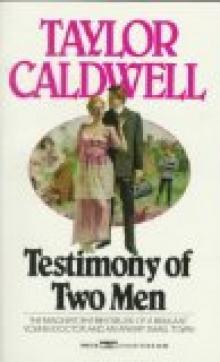 Testimony of Two Men
Testimony of Two Men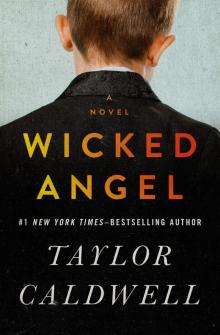 Wicked Angel
Wicked Angel The Arm and the Darkness
The Arm and the Darkness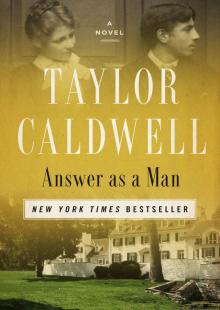 Answer as a Man
Answer as a Man Grandmother and the Priests
Grandmother and the Priests On Growing Up Tough: An Irreverent Memoir
On Growing Up Tough: An Irreverent Memoir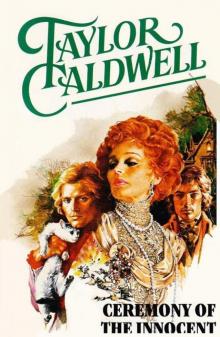 Ceremony of the Innocent
Ceremony of the Innocent The Listener
The Listener Bright Flows the River
Bright Flows the River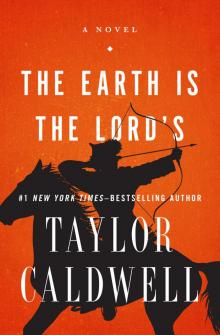 The Earth Is the Lord's
The Earth Is the Lord's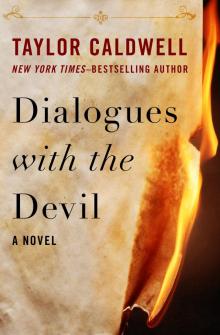 Dialogues With the Devil
Dialogues With the Devil A Tender Victory
A Tender Victory This Side of Innocence
This Side of Innocence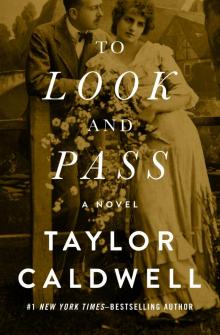 To Look and Pass
To Look and Pass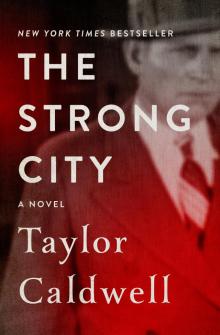 The Strong City
The Strong City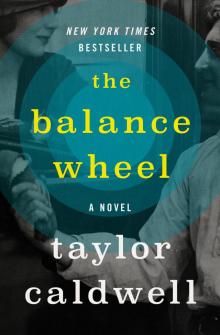 Balance Wheel
Balance Wheel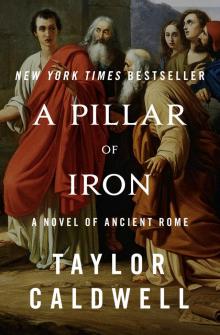 A Pillar of Iron: A Novel of Ancient Rome
A Pillar of Iron: A Novel of Ancient Rome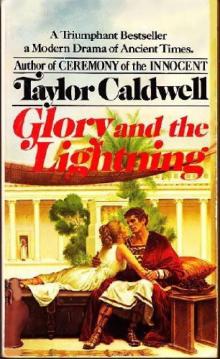 Glory and the Lightning
Glory and the Lightning Dear and Glorious Physician
Dear and Glorious Physician The Wide House
The Wide House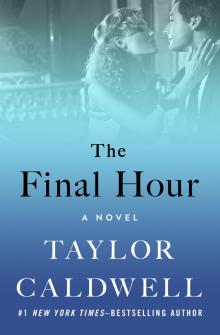 The Final Hour
The Final Hour Never Victorious, Never Defeated
Never Victorious, Never Defeated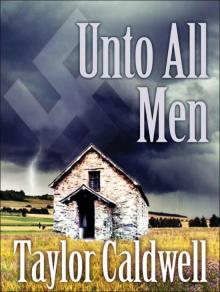 Unto All Men
Unto All Men The Turnbulls
The Turnbulls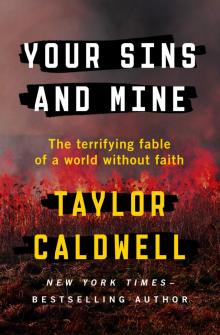 Your Sins and Mine: The Terrifying Fable of a World Without Faith
Your Sins and Mine: The Terrifying Fable of a World Without Faith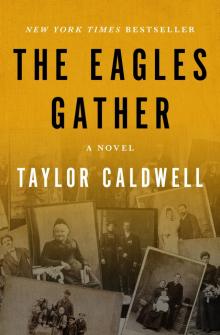 The Eagles Gather
The Eagles Gather Let Love Come Last
Let Love Come Last The Devil's Advocate: The Epic Novel of One Man's Fight to Save America From Tyranny
The Devil's Advocate: The Epic Novel of One Man's Fight to Save America From Tyranny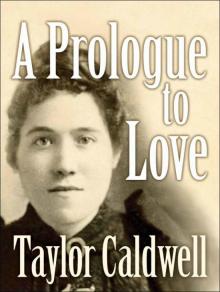 A Prologue to Love
A Prologue to Love Maggie: Her Marriage
Maggie: Her Marriage The Late Clara Beame
The Late Clara Beame Melissa
Melissa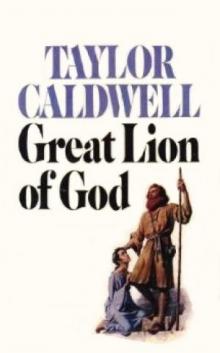 Great Lion of God
Great Lion of God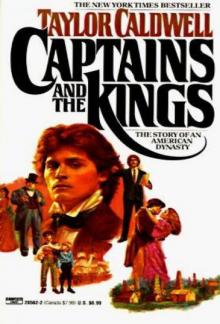 Captains and the Kings
Captains and the Kings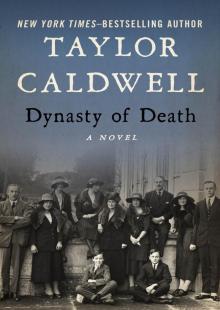 Dynasty of Death
Dynasty of Death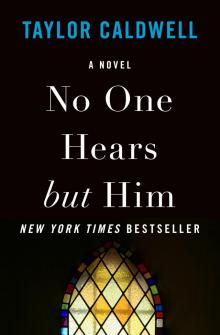 No One Hears but Him
No One Hears but Him The Sound of Thunder
The Sound of Thunder There Was a Time
There Was a Time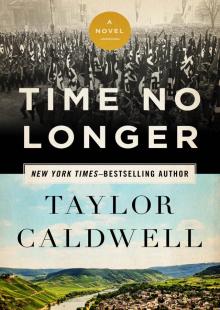 Time No Longer
Time No Longer I, Judas
I, Judas The Devil's Advocate
The Devil's Advocate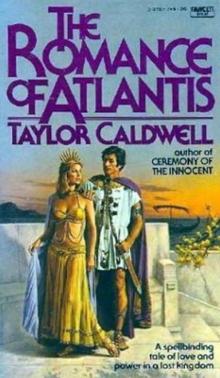 The Romance of Atlantis
The Romance of Atlantis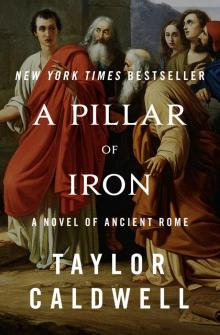 A Pillar of Iron
A Pillar of Iron On Growing Up Tough
On Growing Up Tough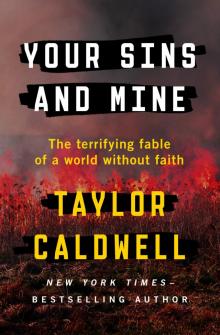 Your Sins and Mine
Your Sins and Mine